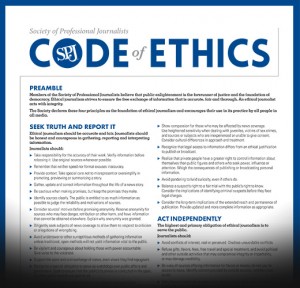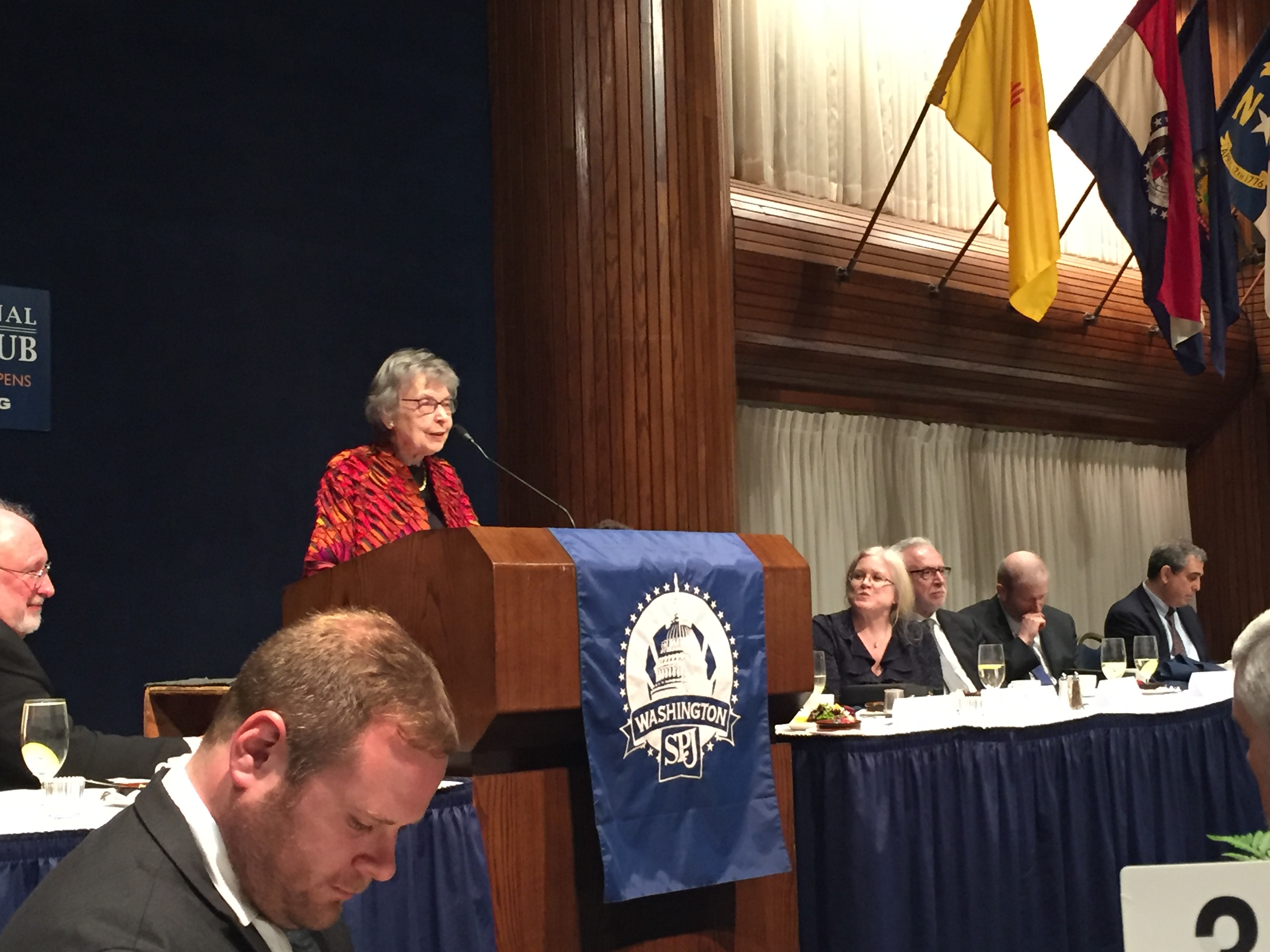
Past president Amy Fickling has years of volunteering service to local journalism
Maurine Beasley, professor emerita at the Philip Merrill College of Journalism at the University of Maryland, a past SPJ DC Pro Chapter president and a past Distinguished Service Awardee, introduced Amy Fickling:
First, let me congratulate all the winners again and pardon me if I point to one specifically, Michelle Singletary, who I first knew years ago as a bright, ambitious, hard-working, lovely — and nice — student at the University of Maryland College of Journalism. Maryland is so proud of her.
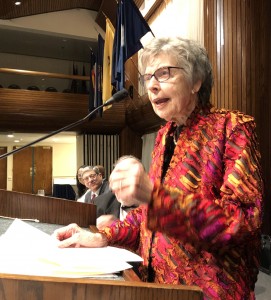
Second, I know we have come to that point of this gala event when we are beginning to think about going home and possibly checking our purses and wallets to make sure we have what we came with. Folks, you can rest assured, you do. Why? Because Amy Fickling is in the room and she is going to make sure that your funds are safe. Amy is the long-time treasurer of the SPJ DC Pro Chapter and the reason that this chapter is in excellent financial order. She makes sure we hold on to our money. We should all be glad to be with her tonight.
Now let’s move from money to arranging things and getting them done, in other words to fixing things up. I realize that SPJ is most unlikely to give an award to Michael Cohen or any of the current political fixers in the news. But Amy fits in the “fixer” category in a positive way.
As a Washington-area journalist, she has succeeded as a writer and editor because she is so conscientious and detail-oriented, a quality that she exemplifies in her current position as an editor with Warren Communications News. Previously she worked at the McClatchy-Tribune News Service.
As a copy editor, she fixes up the mistakes that many of us inadvertently make.
A graduate of Wake Forest University, Amy has devoted her professional career to getting copy right, to informing readers accurately and responsibly. She believes in the need for journalists to band together to insure public understanding of their indispensable role in democracy. Long active in the National Press Club and on the board of the Sigma Delta Chi Foundation of Washington, D.C., Amy been instrumental in arranging for scholarships for students and welcoming newcomers to journalism.
Certainly, she has served the Society of Professional Journalists with exceptional loyalty. She has been president of the DC Pro chapter and national Region 2 director for two terms. To her great credit, when her terms at the top of the organizational chart ended, she did not stop work for the Society, as some do. Instead, as an unsung heroine of our profession, she has agreed to do the jobs that need to be done. I already have alluded to her – yes, I will say it – tight-fisted and long tenure as treasurer. But she has done lots more too — I won’t take time to name everything because it is getting late — except to say that currently she also is editing the chapter newsletter and has even been in charge of tickets for tonight’s event. She is a blessing to SPJ and to our profession. So let’s now congratulate and hear from Amy.
~~~~~
Amy Fickling‘s remarks, as prepared, follow:
As a veteran of many years of attending the chapter’s annual June awards dinner, I can say this event looks different from up here!
You all look great!
And it is a volunteer’s dream — SPJ volunteer or otherwise — to get so many fine journalists together in one room, celebrating so many accomplishments.
I thank my DC Pro Chapter for the honor that allowed me to sit up here at the head table with this year’s most impressive Hall of Fame class — and our award-winning master of ceremonies.
A tip of the hat to our Hall of Fame/Awards Committee chair Steve Taylor, too, for his excellent work that made much of this evening possible.
And my hearty congratulations to all the Dateline Awards contest finalists and winners who are here — I “met” many of you by email over the past month or so.
To our SDX Foundation scholarship awardee here tonight — April Howard — I hope you have gotten a lot of encouragement tonight that you are aspiring to enter a profession that will allow you to make an impact on your generation and beyond.
And Maurine Beasley — thank you for your introduction, and most especially for being a primary mentor for me in my early days with the SPJ DC Pro Chapter. You encouraged me to get on the leadership ladder. Little did I know then that at the top of the ladder, I would then get on a treadmill!
But seriously, it has been honor enough to be a journalist, and to strive to uphold the ideals of truth, talent and energy that SPJ stands for.
I’ve made friends in the organization — in the process of volunteering and working together on projects that help fellow journalists develop skills for their reporting, or to continue a public discourse on how the media covers major events, or to give recognition for outstanding work in the profession.
It’s true that becoming involved begets more involvement, and that has dividends for personal — and corporate * — benefits.
So that’s my plug for joining and becoming involved in SPJ!
I’ve been to several panel discussions in the past couple of months at which some audience questions have referenced the SPJ Code of Ethics — I think that is great, especially since those persons have not necessarily identified as SPJ members, too.
It is a good — some say “the gold” — standard for ALL journalists:
“Seek truth and report it” is the main take-away.
The preamble says:
Ethical journalism strives to ensure the free exchange of information that is accurate, fair and thorough. An ethical journalist acts with integrity.
I just, in closing want to remind everyone who is a journalist here tonight — you just never know whose life you will impact or influence.
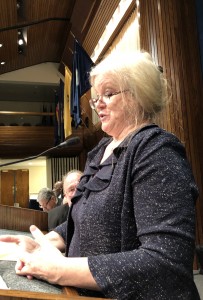
In thinking about this Distinguished Service Award in Local Journalism, I reached back to my time as managing editor of the Gazette newspaper in Olney, Maryland. Olney had — probably still has — an active civic association, and it gave out annual awards. One of my duties as managing editor was to write a weekly “local” editorial to supplement the top one on the page written by the publisher. So, I wrote one about that year’s civic association honoree. Some months later, I attended a funeral service for him, as he’d died suddenly from a sudden illness. One of the speakers at the service began reading from something that had been framed and was sitting on the mantle at Howard’s home: that editorial.
Well, that’s a little sad, but I was so happy I’d written it — for Howard. Happy that it meant something to him.
On a lighter note — I also started up a sometimes-recurring panel of that year’s Pulitzer Prize winners for the National Press Club’s Professional Development Committee on the topic of “How I Got the Story.” The concept was of a tutorial for those who aspire to write like the winners, or even be one of the winners one day. You can still see on the C-SPAN archives a packed panel in 2002 of the winners for the Sept. 11, 2001, coverage — as many of them were based in Washington already.
That panel was actually the second year of the committee’s work on the series.
The inaugural panel, in 2001, featured journalists from the Chicago Tribune and the Portland Oregonian and one from [Rutland,] Vermont, for editorial writing. That panel was on a Monday night, Sept. 10, 2001. So Tom Hallman of the Oregonian had to drive four days to get home after that panel, due to the air traffic stoppage.
Here’s hoping it doesn’t take you that long tonight!
Thank you!
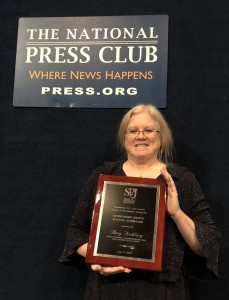
*I used this word in the sense of this definition: “of, relating to, or formed into a unified body of individuals,” not referring to corporations. At least one tweet from the dinner paraphrased this as “employer benefits.” However, it can easily apply both ways, and I have a number of previous employers and my current one to thank for their support of my involvement in SPJ.
The National Press Club member newsletter NPC Wire also had coverage of Amy Fickling’s DSA recognition (here). There you can find out more details of her work in the profession, too.

